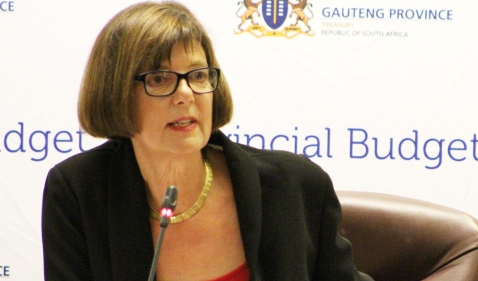Creecy delivers super budget for Gauteng
Khanyisile Mashinini
Barbara Creecy, is Gauteng Finance MEC.
In an unprecedented twist, Gauteng budget has been increased from R108 billion to R112 billion.Twenty-three provincial departments and entities now boast clean audits, meaning that two out of three provincial institutions received unqualified audits with no matters of emphasis, while all other departments received unqualified audits.
This was revealed by finance MEC Barbara Creecy during her mid-term budget speech at the Gauteng Legislature.
Furthermore, the much-maligned health department received the highest increase of R1.7 billion, followed by education department which scooped earth-shattering R942.7 million upsurge.
The MEC also announced that the gambling tax review, which is a process to align Gauteng’s gambling tax regime with that of other provinces, is nearing completion.
“These new regulations will increase the province’s gambling tax revenue by more than 12%,” said Creecy.
The MEC said the current financial state of Health represents a major risk to the public purse. Therefore, the department is allocated R1.23 billion in the adjustment to assist with spending pressures on goods and services and personnel.
“We remain deeply concerned about the extent of medico legal liability facing Health and the threat this poses to the budget for essential health services,” she said.
“To assist with preparations for the opening of schools in January, Education is allocated R942.6 million. This amount includes R138.5 million for school electricity bills and R150 million for teacher salaries due to growth in learner numbers,” argued Creecy.
She also spoke at length about the fight against corruption and argued that there is a need to strengthen and enhance the province’s intervention in the Health legal and medico-legal litigation. In dealing with corruption, she motivated her intention for allocating the premier’s office with a total of R24.6 million.
The MEC stressed that Gauteng Government remains committed to using its considerable buying power as well as vast infrastructure spend to drive meaningful transformation, empowerment, job creation and economic inclusion in the mainstream economy.
She also revealed that since 2014 the government has spent 92% of its goods and services budget, procuring from historically disadvantaged individuals.
“A total of R100 million is allocated to the Department of e-Government to fast-track connectivity for the Gauteng Broadband Network project and to improve existing local area networks (LANs),” she said.
Creecy also emphasised that good governance is an important pre-requisite for an effective developmental state.
“Corruption is not a victimless crime and misappropriation of government resources hits the poor and the vulnerable in society hardest.
“We therefore have a common duty to fight corruption and build ethical leadership in government and society.
“All Gauteng departments and entities have also been working hard to ensure better financial management and greater public accountability in the use of public funds,” she said.
The MEC also reported that over the last three years provincial government had saved nearly half a billion rand by cutting expenditure on non core items. She also argued that further savings are in the pipeline as a result of introducing voice over IP which is estimated to save 75% on telephone budgets.
“The next three years will be difficult for the province. Gauteng will primarily depend on provincial revenue, off budget investments, and partnerships to close funding gaps in its budget. This is because National Treasury will not significantly increase allocations to the province.
“Despite sluggish economic growth, we have managed to increase our own provincial revenue collection from R4, 9 billion in 2014/15 to R5, 8 billion in 2016/17. This represents an increase of 16% over the past three years,” she explained.
Her point of departure was that the province’s owned revenue generated is an important source of income for provinces.
“This is because it assists in augmenting funding of provincial priorities such as education, health and social welfare.”
See below budget allocations for all the departments
- Office of the premier – R24.6 million.
- Health – a total of R1.7 billion (R1.23 billion.
- Education: a total of R942.6 million.
- Social development – R16.9 million.
- SACR – R37.6 million.
- Community Safety – R27.5 million.
- Roads and Transport – R159.2 million.
- Agriculture and Rural Development – R18.8 million.
- Human Settlement – R69.8 million.
- E-government – R100 million.
- Infrastructure Development – R207.123 million.


